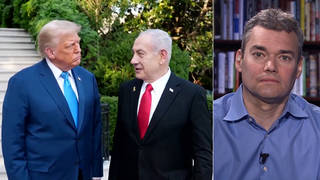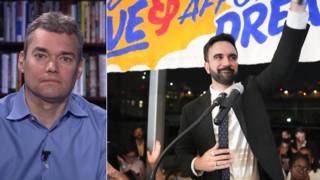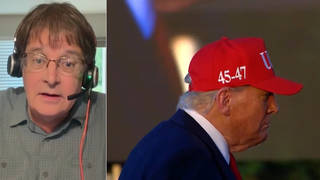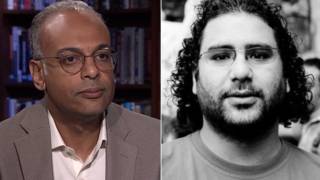
Topics
Democracy Now! senior producer Sharif Abdel Kouddous speaks with Alaa Abd El Fattah, an Egyptian activist and blogger, about youth organizing efforts as they stand on the 15th day of the uprising.
ALAA ABD EL FATTAH: I’m Alaa Abd El Fattah. I am a blogger and an activist. And we’re here in Tahrir Square in — what is it? This is the 15th day of the revolution. In terms of what’s happening right now, the numbers are swelling again, but people have been discussing, like, the best methods to escalate the pressure on government for a while. It’s a very slow process, making a decision among this crowd.
Some of the proposals are that, you know, a small number of protesters would — like a small sample of protesters would leave the square and head towards the TV building, because right now that’s the regime’s strongest castle. That’s where they’ve been mounting their latest attacks. And we know — I mean, it’s thousands of people work there, and we are sure the majority of them are with us, but they continue to obey orders and so on. I’m not sure this is going to be successful.
Another proposal that is being discussed is to actually — how do you say that in English? — is to actually, like, change the rules of how Egypt is governed, enforce people power in institutions. Since people are going back to work now, for since the beginning of the republic, we haven’t had the right to establish unions. All elections, you know, like official syndicates or labor unions or so on, were not free elections, were like full of discrepancies and forgery and so on. So there’s now a call for people to liberate their workplaces, to enforce and, you know, put facts on the ground around that.
Some of that has been happening in other cities, like in Suez they’ve actually elected a governor. They kicked the current governor, who — governors have been appointed by the President since '85, I think, or something like that, and they've elected one.
So, in the past five years, many independent labor unions were established. They are not recognized by law. So now they want to call for general assemblies in their labor unions and re-elect, so that the independent labor union becomes the labor union, and the government-controlled one no longer exists. If this happens, even on a small scale, I think that will be great. That will be massive pressure on the government, but it will also mean that the revolution is making gains and changing Egypt right now, not just when Mubarak leaves or if Mubarak leaves.
SHARIF ABDEL KOUDDOUS: Now, members of the six established opposition parties met with Omar Suleiman, as did the Muslim Brotherhood, as did some younger activists. What are your thoughts on these talks?
ALAA ABD EL FATTAH: Apart from the political parties, these younger activists, nobody knows them. We don’t know who they represent. So the only representation for young activists who are part of known political groups is the group called [in Arabic], which means the Coalition of Young Revolutionaries, or whatever. They don’t represent — they don’t claim to represent all of the revolution. They basically represent political parties and organized groups like 6 of April, Kefaya and so on. And they’ve only been meeting with the Committee of Elders, or Committee of Wise Men. They’ve been only pressuring their parties’ leadership; they have not been in direct talks with the government.
All opposition parties — or, like the six recognized opposition parties and the Muslim Brotherhood met. My understanding is that they all pulled back from negotiations because the government was not serious about it. The recognized political parties have always been playing a very soft game. They’ve always been part of legitimizing the regime, so we don’t really trust them, though many of their cadres are with us, you know, like we disassociate the institution from the people.
For the Muslim Brotherhood, I think it was a calculated move on their part, and I think it was a very good idea. They have been — the government has always treated them as a banned group, as an illegal group. Sometimes we tolerate them, sometimes we crack down very heavily on them, but, you know. So, by going to meet Omar Suleiman, who is also a figure not just of the establishment but also of the security establishment and the cooperation with the U.S. government in anti-terrorism and so on, so he is very much a symbol of absolute intolerance to Islamists of all kind — so, by going to meet him, they make a point that we are a legitimate group. And then, they were the first to pull out of negotiations, and they were the one with the most forceful message. So, I don’t think there’s anything negative in them going there. They’ve established their legitimacy, which also means that they’ve established the legitimacy of any group, that their legitimacy comes from popular support and not from state recognition or anything like that.
SHARIF ABDEL KOUDDOUS: Now, there’s been a lot of debate over what comes next after Mubarak, how to implement certain changes, how to dissolve parliament, how to amend the constitution. What are you calling for?
ALAA ABD EL FATTAH: A lot of this is very technical, and, you know, you hear multiple propositions. Most of them sound reasonable. So, I know more about what I don’t want than — I mean, what I personally dream of is revolutionary mandates, that we don’t need to deal with the complexities of the current constitution. The current constitution was created by an illegitimate government anyway. I’m a radical leftist, but I can’t claim that this is the general mood in the square or in other cities, you know, among the revolutionaries. Egyptians — it’s amazing that this uprising is happening, and it’s been an incredible one, but Egyptians are generally, you know, conservative in their action. And so, the moment you remove the very hated enemies, I think, I’d expect that a majority of them would ask for smoother transitions.
There’s also other benefits for smoother transitions. Like right now everyone is — we are really united, but there are topics that are very divisive. They are just not relevant right now. But if we immediately embark on writing a new constitution, revolutionarily reshaping Egypt, we might have to start discussing secularism versus — you know, everyone wants a modern civic state, but how secular or — and that’s just one example of these very divisive topics. So, it may be that it’s better to heed the advice of people who are telling us how to do these transitions smoothly.
But I think anything that requires a regime figure like Omar Suleiman overseeing the transition period is not acceptable. We can’t trust them. We don’t even trust that they represent — we can’t trust that they would not try to maintain a security regime, even within democracy. We can’t trust that they would not try to impose, you know, this continuation of the policy of heeding all imperialism, of heeding the interests of Israel and the U.S. and all these imperialist-imposed policies that Egypt has been having, and even on a symbolic level.
The original call was for the regime to fall. We are focusing now on Mubarak because Mubarak tried to reshuffle cards and remain in power. So that’s why we are now really focusing on Mubarak. But the goal of this revolution has always been for the whole regime to fall. And so, a regime figure being the custodian of the transition period is unacceptable. But things like the head of the constitutional court, although he’s not very independent, but at least his position is, or a presidential council that is mostly manned by judges, proposals like these are reasonable and possible.
SHARIF ABDEL KOUDDOUS: Today marks the two-week anniversary of the beginning of this uprising. Do you think you will ultimately be successful in toppling Hosni Mubarak?
ALAA ABD EL FATTAH: Well, I think we already are. I mean, it doesn’t seem like Mubarak is in power. In the minds of everyone here and many who aren’t here, he is already the deposed president. And, you know, this current phase is really about what happens next. And so, we are continuing the pressure because we want what happens next to be power to the people and to be through democratic Egypt that represents all of its people.
We should also remember that the initial slogans were not just “Topple the regime” but also [speaking in Arabic], which is “Bread! Freedom! Social justice!” And we will need a lot of pressure in order to achieve something like social justice, because that doesn’t just hit the interests of the regime, but, you know, broader interests, although the unity that you see here, the number of people representing all classes, I think it means that even the very rich — you know, the ones who didn’t flee the country — agree that the need for social justice and for bread and freedom is universal.












Media Options